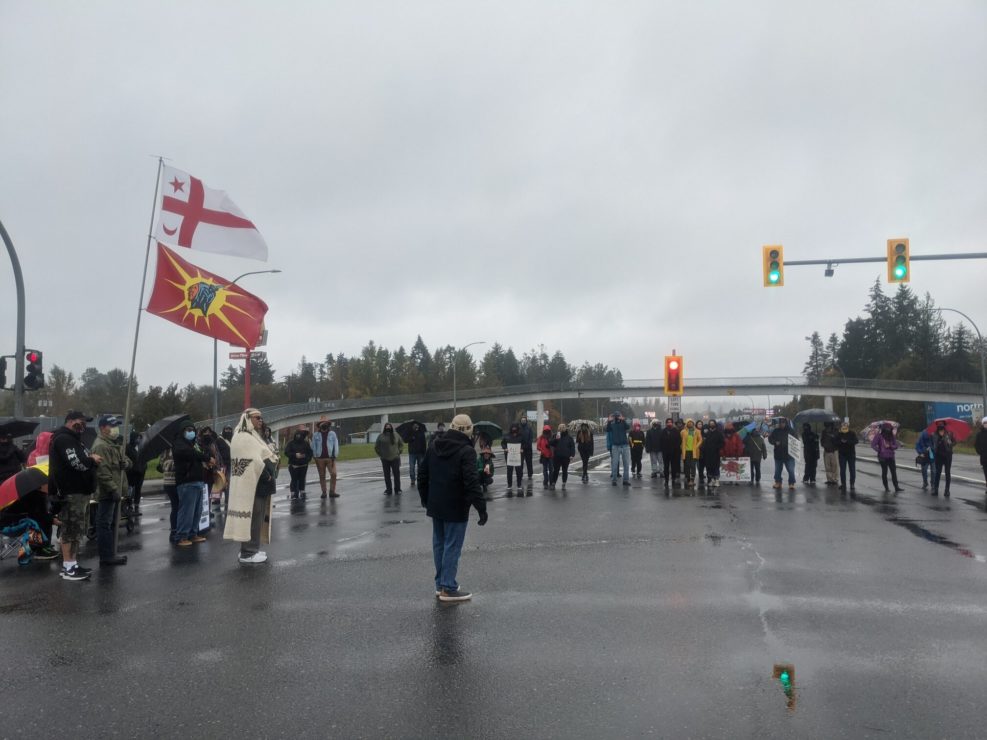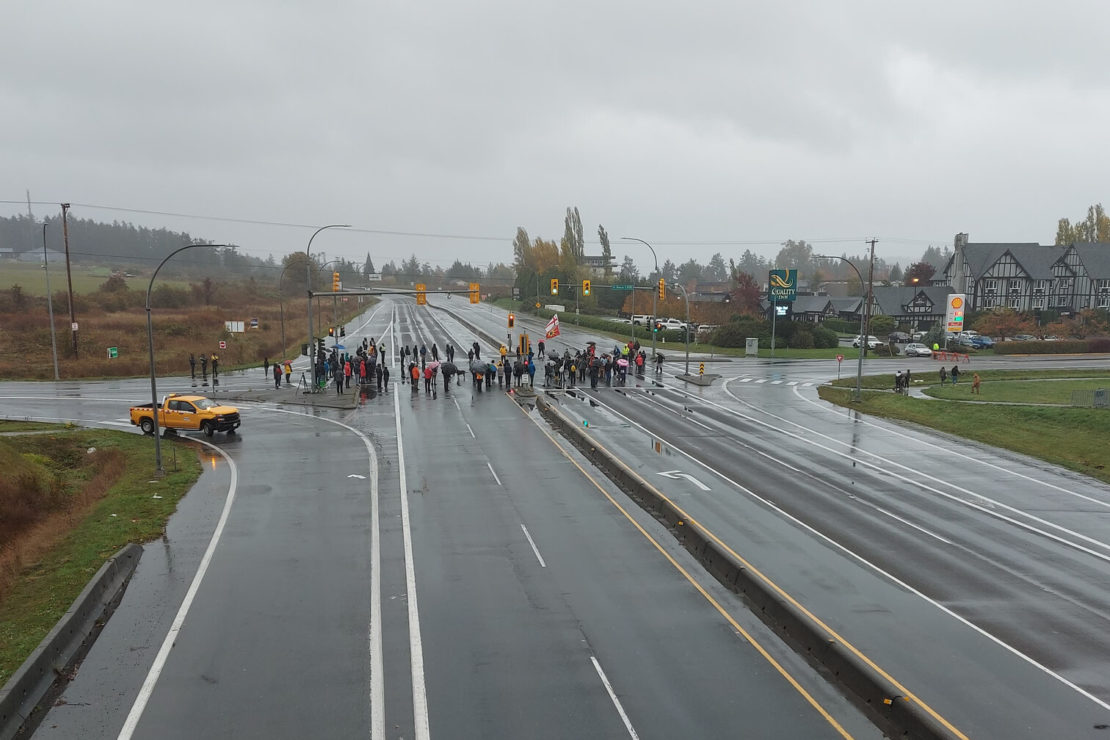More than 100 people gathered at intersection of Patricia Bay Highway and Mt Newton Cross Road

For members of the Tsawout and other W̱SÁNEĆ nations, the struggles of the Mi’kmaq are ones they know all too well. At a blockade of the Patricia Bay Highway on Oct. 23, a crowd of over 100 supporters joined members of W̱SÁNEĆ nations and Mi’kmaw guests to stand in solidarity with the Mi’kmaw fishers.
The Mi’kmaq in Nova Scotia continue to be terrorized by non-Mi’kmaw fishers, despite the inherent and treaty-affirmed rights of the Mi’kmaq to fish on their lands. The Sipekne’katik First Nation started their own Moderate Livelihood Fishery, and faced conflict immediately despite aspiring to fish only a small portion of what the non-Mi’kmaw commercial fishers catch.
“Everything that we need is provided for us by our environment,” a W̱SÁNEĆ elder said. “Whether it’s food, medicine, plants, whether it’s our fisheries … as saltwater peoples it’s really important to come together.”
For one hour, songs, ceremony, and strong speeches filled the normally traffic-filled highway. The blockade took place near the Tsawout reserve, in the middle of the intersection of Mount Newton Cross Road and the Patricia Bay Highway. Traffic was diverted from Island View Road to Amity Road.
The Indigenous speakers at the blockade voiced their shared frustration with the ongoing inaction by the federal Department of Fisheries (DFO) and RCMP in protecting Mi’kmaw Fishing Rights from the violent attacks.
“We feel that Trudeau is ignoring us, not upholding our treaties, [and is] fearful of backlash from people who probably vote for him,” Tracy Underwood, one of the organizers of the W̱SÁNEĆ blockade, told the Martlet. “If he stood up and said that people need to acknowledge our treaty rights then he would be doing a service to our people.”

The Mi’kmaq’s inherent right to fish was affirmed by a treaty in the 1700s. It was later affirmed in Section 35 of the Canadian Constitution Act of 1982 and the R. v. Marshall case in 1999. Marshall said that the Mi’kmaq have the right to fish for a “moderate livelihood,” but DFO regulations have not defined this. On Sept. 4, DFO began seizing Mi’kmaw lobster traps without cause.
The Mi’kmaq have faced increasing violence in recent weeks from non-Mi’kmaw commercial fishermen. APTN has reported on the developments on the ground.
When Mi’kmaw fishers from the Sipekne’katik First Nation, a Mi’kmaq band, opened the Moderate Livelihood Fishery on Sept. 17, they were met with disrespect from non-Mi’kmaw commercial fishermen. Two people were arrested on charges of assault at an anti-Mi’kmaq protest the next day and the Mi’kmaw Chiefs declared a state of emergency on Sept. 18.
Mi’kmaw boats, gear, and traps continued to be vandalized as the non-Mi’kmaw fishermen grew increasingly violent. On Oct. 5, a Mi’kmaq boat was burned. Shortly afterwards, a vehicle was set on fire at a storage site and a pound with lobster caught by Mi’kmaw fishermen was burned to the ground.
Recently, on Oct. 22, the Mi’kmaw fishers were granted an injunction. The RCMP have been consistently criticized over their failure to act and protect the Mi’kmaq’s treaty rights and property.
Although the federal government has promised to work with Mi’kmaw fishermen to resolve the conflict, Indigenous communities across the country say they feel ignored by the government.
Underwood says that the W̱SÁNEĆ people have themselves been the victims of colonial violence while trying to practice their fishing rights.
“We know what [the Mi’kmaq] are going through,” says Underwood. “We had a few of our hunters speak to even in recent times being handcuffed to their boat.”
Underwood also spoke about how her dad’s catches used to be confiscated by the DFO and left on the beach to rot.
For Underwood and many others, today’s blockade shows that the issues facing the Mi’kmaq are not isolated and represent an ongoing struggle for Canada’s Indigenous peoples.
“It’s a Canada issue,” says Underwood. “We fight the system still when we try and practice our rights to hunting and fishing and gathering.”
As the highway blockade ended, organizers encouraged the group to follow behind the guests from the Mi’kmaq nation and walk in a circle around the intersection to symbolize unity. The group walked back to the Tsawout offices and dispersed, and the highway was once again filled with the normal stream of traffic.






